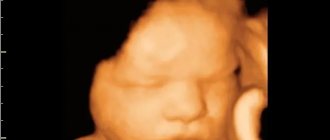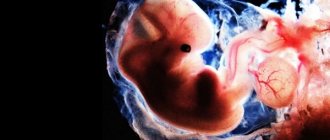Causes
Changes in thermometric indicators in pregnant women are common. And if a slight increase is normal, then special attention should be paid to the appearance of low body temperature during pregnancy.
Often this symptom indicates a specific pathology – hypothyroidism. This is a disease of the endocrine system, manifested in insufficient production of thyroid hormones. In addition to laboratory indicators, the development of the disease is indicated by the condition of the expectant mother: she becomes lethargic, sleepy and constantly complains of fatigue. Due to the pathology, the pregnant woman develops swelling, so there is no need to hope that the ailment will go away on its own. If your body temperature does not exceed 36° C, you should consult a therapist or endocrinologist.
Hypothermia can be a fairly serious and dangerous condition. The occurrence of this symptom can be provoked by a respiratory infection, toxicosis, weakened immune defense, and disruption of the central nervous system.
In addition to the above, the following reasons are distinguished:
- Insufficient nutrition with regular feeling of hunger. When a pregnant woman eats, her body temperature usually returns to physiological levels.
- Anemia. There is a direct connection between low hemoglobin levels in the blood and low temperature during pregnancy. Read more about anemia during pregnancy→
- Excessive loads. Fatigue can manifest itself as hypothermia.
- Hypoglycemia. Lack of blood sugar often leads to a decrease in body temperature. In addition, the expectant mother is worried about excessive weakness and dizziness. In severe cases, nausea or vomiting appears, the skin turns pale and becomes covered with sticky sweat. This condition can occur during fasting, poor nutrition, and may also indicate the presence of diabetes mellitus.
Diseases that cause hypothermia
The ideal temperature for a person is 36.6 degrees, but it can change even in healthy people throughout the day. In the morning the values are always slightly lower; in the evening they can rise. Therefore, the range of 35.8–37.0 degrees is considered normal. Hypothermia means a prolonged decrease in temperature to 35.0 degrees or below. Pathology occurs in various diseases and is accompanied by additional unpleasant symptoms.
What diseases are accompanied by hypothermia:
- hypoglycemia in diabetes mellitus;
- AIDS;
- the body has malignant tumors, radiation sickness;
- anemia, low hemoglobin, severe blood loss, sepsis;
- depressive states;
- vegetative-vascular dystonia;
- dysfunctions of the brain, thyroid gland, adrenal glands;
- hypothyroidism;
- hormonal imbalance;
- acute cerebrovascular accident, myocardial infarction;
- severe poisoning.
The reason for a sharp decrease in temperature values to 35.2–35.5 degrees can be a loading dose of antipyretic drugs for colds, flu, uncontrolled use of sedatives, barbiturates, antidepressants, poisoning with poisonous and toxic substances. Hypothermia is often diagnosed after surgery, with severe burns. In women, the indicators are affected by the phase of the menstrual cycle.
Other causes of low temperature
All people are different, so a long-term decrease in temperature below 35.8 degrees is not always a pathology.
Why does the temperature drop:
- old age - in older people the temperature is often lower than normal, which is associated with certain processes in the body;
- physiological characteristics - a temperature of 35.6–35.8 degrees occurs in people with chronically low blood pressure, but no particular deterioration in well-being is observed;
- asthenic physique - in such people metabolic processes proceed slowly, so the temperature may be below 36 degrees;
- pregnancy, menopause - if a woman feels normal, medical intervention is not required.
A temporary decrease in temperature values occurs during hypothermia, prolonged stress, overwork, chronic lack of sleep, shock, after fasting or extreme diets, and against the background of alcohol intoxication. The causes of hypothermia in young children and adults are identical. After 10 years of age, a child often develops a low temperature, which is associated with the onset of puberty and significant changes in the body.
Is this the norm?
You should not think that the appearance of a low temperature during pregnancy necessarily indicates a pathological process in the body. Among the various reasons that provoke hypothermia, doctors often indicate the state of pregnancy itself. Moreover, this may be one of the early diagnostic signs indicating that new life has arisen in the uterus.
Often, low body temperature during early pregnancy, and sometimes in the second trimester, is a common physiological reaction that develops in response to the growth and development of the fetus in the mother's body.
Also, hypothermia is sometimes an individual feature of the expectant mother, which she might not even suspect before conception, since previously it did not cause any unpleasant sensations or discomfort.
What to do if your temperature drops during pregnancy?
To restore temperature balance in the body, it is necessary to identify the main reason for the decrease in the indicator. Treatment during pregnancy will depend on the results of diagnostic studies.
If hypothermia is associated with exhaustion of the body and low immunity, the mother should eliminate physical and psychological stress, maintain a sleep-wake schedule, and spend more time in the fresh air. Particular attention should be paid to the diet, which should be dominated by natural foods high in nutrients.
In some cases, to increase the temperature, you will need to take vitamin and mineral complexes. If the expectant mother is diagnosed with anemia, the doctor will prescribe iron supplements.
How to increase the temperature?
In situations where the doctor excludes the presence of any disease or disturbance in the functioning of internal organs at low body temperature, no special treatment is required.
A woman carrying a child must adhere to certain recommendations:
- eat regularly and balanced;
- provide yourself with adequate sleep and timely rest;
- try to maintain a positive mood;
- take prenatal vitamins.
The appearance of low body temperature during pregnancy can be both a pathological and physiological sign.
If the expectant mother feels well, and all laboratory and diagnostic indicators are normal, then there is no reason to worry. But if a pregnant woman feels weakness or pain, this is a reason to consult a doctor to find out the reasons for the development of this condition.
A timely visit to the doctor will prevent negative consequences for both mother and child.
Author: Violeta Kudryavtseva, doctor, especially for Mama66.ru
Of course, every prudent expectant mother tries to take care during pregnancy, but nevertheless, many catch a cold - after all, the immunity of pregnant women is very significantly reduced. Therefore, even those factors that we are accustomed to not noticing can have a negative impact.
What are acute respiratory infections and acute respiratory viral infections? There is no diagnosis of a cold. The doctor writes ARVI. What is it? ARVI is an acute respiratory viral infection. The familiar flu refers specifically to ARVI. The main symptoms of ARVI are general intoxication of the body and damage to the respiratory tract. Intoxication of the body is manifested by increased temperature, weakness, muscle pain, and aching joints. Damage to the respiratory tract - runny nose, pain and sore throat, cough, change in voice. The nature of the manifestation of these symptoms, for example, the color of sputum, the nature of the cough, etc., depend on the causative agent of the disease.
What are the dangers of acute respiratory infections during pregnancy? The greatest danger is caused by viral infections (ARVI). The degree of danger depends on the stage of pregnancy.
The most dangerous period is the first trimester . At this stage, the baby is not yet protected by anything and the virus can cause developmental defects, including those incompatible with life and cause miscarriage.
In the second and third trimester, during normal pregnancy, the baby is reliably protected by the placenta, which is an insurmountable barrier to most infections. But with accompanying complications of pregnancy leading to disruption of placental metabolism (for example, histosis, threat of miscarriage, exacerbation of various chronic diseases), serious consequences can occur in the second and third trimester.
So, until the middle of the second trimester , a viral infection can disrupt the formation of organs of the central nervous system - the brain and spinal cord, as well as other systems.
From the second trimester, intrauterine infection of the fetus is possible with the development of an infectious and inflammatory process in various organs, for example, meningitis, encephalitis, pneumonia, etc. Malnutrition of the fetus can also be observed and, as a result, a lag in its physical development.
If the mother caught a cold shortly before giving birth , then at birth the baby may show signs of hypoxia: the baby is lethargic, pale, the cry is weak, and there may be breathing problems. Then the child requires urgent treatment, and may even have to stay in the intensive care unit. In addition, after suffering from hypoxia, the child is more susceptible to birth trauma.
But there is no need to panic if you catch an acute respiratory infection or acute respiratory viral infection. According to statistics, 80% of women experience a cold in one form or another, most of them at the beginning of pregnancy, but for the majority, the pregnancy ends successfully, and, despite the illnesses they have suffered, they give birth to healthy babies.
How to treat acute respiratory infections? First, it’s worth listing what you should never do during pregnancy. No antibiotics, dietary supplements! Also forget about hot baths, steam rooms, foot baths. Never use aspirin or medications containing it (for example, Coldrex or Efferalgan). To reduce the temperature, do not use rubbing alcohol. Wool socks are also not a good idea.
If you have a runny nose, you should not self-prescribe or use medications containing vasoconstrictor components, such as SANORIN, DLYANOS, NAZIVIN, GALAZOLIN, OT-RIVIN, NAPHTHYZIN, etc. They can only be prescribed by a doctor and only if there are strict indications.
What can be used to treat acute respiratory infections during pregnancy?
To relieve fever, you can use paracetamol and drugs based on it. You can also wipe yourself with water at room temperature; in extreme cases, to quickly lower the temperature, you can add a little vinegar essence to the water, but just a little.
It is advisable to bring down the temperature with medications only if it has risen above 38 degrees. A temperature of up to 38 degrees indicates that the body is fighting infection - after all, this is a protective reaction of the body. It is at elevated temperatures that the production of interferon increases, a substance necessary to fight infectious agents, in particular viruses. In addition, an increase in body temperature causes the death of a number of pathogens.
But you should not expose the fetus to high temperatures for more than two days - elevated temperatures can lead to disruption of metabolic processes.
For a runny nose and sore throat, you should use folk remedies. Suitable rinses and inhalations based on eucalyptus tincture, sage decoction, soda, calendula tincture, malavita.
For inhalation, you need to bring the water to a boil, bend over at a distance of 25-30 cm from the surface of the water and breathe through your mouth or nose, depending on what you are treating - a cough or a runny nose. Inhalations are carried out every 2-3 hours.
If you have a runny nose, you can clear your nose with AQUA-MARISA - 1-2 sprays into each nostril 3-6 times a day. You can use homeopathic spray EUPHORBIUM COMPOSITES, EVA-MENOL ointment, oxalic ointment, PINOSOL ointment and drops.
For a sore throat, you can use aerosols STOPANGIN, GEXORAL. From the second trimester - KAMETON. You can also use medicinal lozenges for resorption with essential oils, for example, NEO-ANGIN and DOCTOR THEIS ANGI-SEPT, which have weak antiseptic and anti-inflammatory properties.
Nutrition during illness should be balanced - do not forget about vitamin complexes, fermented milk products, low-fat broths and soups. Appetite usually decreases when sick, but care must be taken to ensure that the baby receives a sufficient amount of nutrients.
You need to drink more water - at least 2 liters per day. Water very well removes toxic substances from the body that poison it. It is best to drink drinks such as weak tea with lemon, rosehip infusion, cranberry or lingonberry juice, dried fruit compote, and alkaline mineral water. At the same time, you need to ensure that approximately the same amount of water is removed from the body per day as you drank. But if you have severe edema or gestosis, then to remove toxins from the body you will have to go to the hospital - there, under the supervision of a doctor, you will undergo detoxification. You cannot prescribe diuretics yourself!
Prevention Of course, it is better not to get sick than to be treated. How to protect yourself from colds?
- watch your diet. Don't forget to take vitamin complexes.
- dress according to the season - you should not be cold or sweaty.
- avoid being in a confined space with a lot of people (transport, shops, etc.)
- Before visiting public places, lubricate your nose with oxaline ointment.
- Ventilate the room frequently and leave the room yourself.
- Carry out frequent wet cleaning, humidify the air in every possible way.
- You can place plates of chopped garlic and onions around the apartment.
- If one of your household members is sick, isolate him and wear a gauze bandage.
We hope that with our advice you will be able to avoid acute respiratory infections or acute respiratory viral infections! And if you do get sick, you will get over the disease as easily as possible! Prevention department
Overwork of the body
A temperature of 36.7 during pregnancy may be the result of frequent emotional stress or lack of sleep. Excessive psychological or physical stress has a negative impact on the functioning of the entire body. Overwork, in the absence of compensatory recovery, leads to exhaustion of the body, which can threaten the further course of pregnancy.
A low temperature during pregnancy (36.8 and below) does not always indicate a disorder in the body of the expectant mother. If you notice such a phenomenon, you should consult your doctor. The specialist will conduct a thorough medical examination, the results of which will confirm or deny the presence of pathology.
Timely implementation of adequate therapeutic measures will prevent the development of dangerous complications.
Useful tips in the third trimester
In the third trimester of pregnancy, it is recommended to visit an obstetrician-gynecologist every two weeks. Around the 30th week, it is recommended to start searching for a suitable maternity hospital and attend antenatal classes.
Advice! Make a list of necessary items for the hospital in advance, do not leave it until the last minute.
Exercises for pregnant women: preparing for childbirth
At this stage of pregnancy, the most important are relaxation exercises, which will help relax the muscular corset and reduce the severity of back pain. Any physical activity during pregnancy should only be done under the supervision of an experienced professional.
Back pain and muscle spasms are considered an inevitable part of pregnancy, although it's worth knowing that expectant mothers can effectively counteract them with regular, low-intensity exercise.
Nutrition for pregnant women: features of the third trimester
The diet for pregnant women should consist of proteins, dairy products, fruits, vegetables and carbohydrates present in every meal. In the third trimester, calcium is extremely important, which is necessary for the formation of the baby's bones. Also in the third trimester, a woman should consume at least 2,300 calories per day.
What vitamins should I take?
Due to the fact that in the third trimester the fetus needs more calcium to build bone mass, it is advisable to take it as a dietary supplement, in addition to vitamin D3.
There are a variety of vitamins intended specifically for pregnant women; your doctor will help you choose the best one.
Childbirth preparation courses
One of the important components of successful childbirth and comfortable motherhood is the information and physical preparation of a woman. Every antenatal clinic has courses for expectant mothers, where they will tell you the following:
- Stages of the birth process. Possible medical interventions are caesarean section, epidural anesthesia.
- How to relieve pain during childbirth using breathing, massage and comfortable birth positions.
- The first days of caring for your baby - basic hygiene and daily routine.
- Breastfeeding - how to establish breastfeeding and what options for assistance are available (pacifiers, specialized formulas).
Preparing to move to the maternity hospital
The main preparation is to collect things for the maternity hospital. Usually, the doctor can provide a ready-made list of items needed for mother and baby in the hospital. The standard things you will need are the following:
- Children's bodysuits (with short or long sleeves depending on the season), socks, hats, envelopes.
- Disposable diapers, wet wipes, anti-irritation cream, personal hygiene products.
- Baby bottles, pacifiers, specialized formulas if breastfeeding is not possible.











